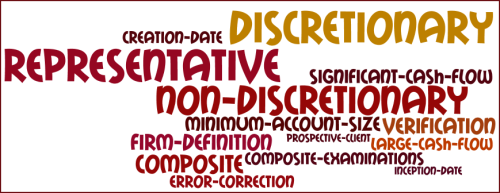Let’s face it, there’s a lot about the Global Investment Performance Standards (GIPS(R)) that can be confusing, and much is owed to some of the terminology that’s used. This post will only focus on one of those terms: discretionary, as in “all fee actual, fee paying, discretionary accounts” having to be included in at least one composite.
Discretionary and representative
GIPS inherited the use of the term “discretionary” from the AIMR-PPS(R). Since the word already has a long history in the investment community, its meaning is quite well known: essentially the awarding of the right to trade on someone’s account. If I have a discretionary brokerage account, for example, I’ve granted my broker the right to buy and sell for me, without needing my approval. This can be categorized as “legal discretion.” If you don’t have legal discretion over an account and execute trades without first running them by the client and getting their approval, you can be in serious trouble.
In “GIPS speak,” discretionary means something very different. It refers to the case where an account is representative of the composite’s strategy.
Why wouldn’t an account be representative?
An account is most likely representative if its strategy aligns with that of the composite, and the client hasn’t imposed restrictions or requirements on their account that would cause the account to become … well, non-discretionary!
The “IBM” of examples when it comes to discretion seems to be “no sin stocks,” since we generally know what’s meant (even though we may not agree on what constitutes “sin”). If you have a client that requires that their portfolio not hold any “sin stocks,” then you need to (a) understand what THEIR definition of “sin” is, and (b) ensure that none of the securities you purchase are sinful.
If, for example, your client’s view of sin is tobacco, alcohol, and gambling, and your composite’s strategy often invests in securities in these sectors, then you may conclude that their absence from this client’s account will cause it to not be representative of the strategy. And therefore, you’d label it “non-discretionary.”
Of course, your policies and procedures will need rules, clearly stated and defined, that you’ll use as the basis for flagging such accounts.
Is there really a problem with the use of the term “discretionary”
Yes! Absolutely! Without a doubt!
At least we think so!
Since most portfolio managers and their teams recognize the term “discretionary” in the context of the granting of trading authority, their initial response is relative to this framework. GIPS essentially assumes that the accounts are legally discretionary, and the term is only used within the context of the account being “representative.” Just about every time I deal with a new verification client, they think of the term “discretionary” only in the context of legal authority.
And so, we have a conflict, which can be easily (?) satisfied, I believe.
While I think qualifying the term with the word (actually abbreviation or acronym) “GIPS” (as in “GIPS discretion,” or “GIPS discretionary”) would work, perhaps substituting the word “representative” would be better. We’d then have something like “all actual, fee paying, representative accounts must be included in at least one composite.”
What say you?
Discretionary, representative, or something else?
PLEASE take our VERY short survey!
Do you think that this really isn’t a problem? Or, do you agree that the term can be confusing?
We’ve created a VERY brief survey, and ask that you take two minutes and fill it out. We’ll compile the results and post them in the near future.
We don’t expect the Standards to change any time soon; but perhaps the next time it goes through a revision, this topic might be brought up and an alternative wording adopted. Just a thought. Feel free to comment here, too! Thanks!!!

